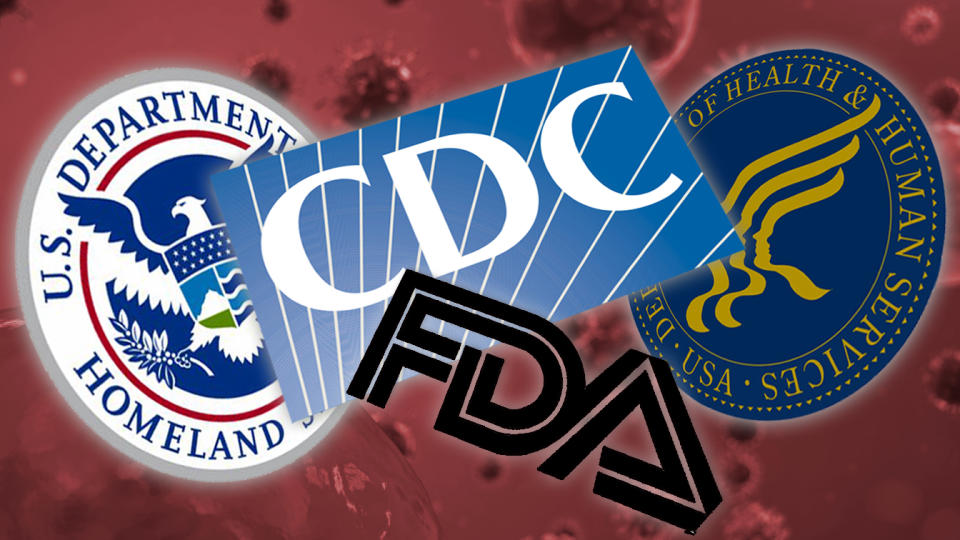CDC, FDA, HHS: The federal agencies fighting the coronavirus
From the National Institute of Allergy and Infectious Diseases to the Transportation Security Administration, seemingly every acronymed agency in the federal government has a hand in the coronavirus response. That’s because the outbreak has required a whole-of-government response that touches everything from airline routes to vaccine research.
Below, some of the many agencies leading the fight.

Centers for Disease Control and Prevention
Based in Atlanta, the CDC is the nation’s foremost public health agency. It is currently headed by Robert Redfield, MD, who is known for his past espousal of conservative views on subjects such as HIV prevention — he promoted sexual abstinence and opposed distribution of condoms — which have sometimes been at odds with the medical establishment, and, in the current environment, for his fulsome praise of President Trump.
The CDC has been the White House-designated clearinghouse for basic facts about the outbreak.
However, it has also faced intense criticism for creating a faulty coronavirus test when a fully functional one was already available from the World Health Organization. Even after the CDC fixed the test, it did not distribute test kits widely, leaving many Americans wanting or needing a coronavirus test unable to receive one.
Food and Drug Administration
Any coronavirus test, treatment or vaccine will have to receive approval from the FDA before it is administered to the American public. Tasked with overseeing the safety of “biological products [and] medical devices,” the agency is headed by Stephen Hahn, MD, who previously headed the renowned MD Anderson Cancer Center in Houston.
Hahn has generally stood shoulder-to-shoulder with Redfield at White House press briefings on the coronavirus. For the most part, his — and the FDA’s — role on the White House coronavirus task force has been to make sure the CDC-created test kits get to as many people as quickly as possible.
He had promised that a million coronavirus tests would be performed by the end of last week, a figure that was quickly branded as unrealistic.
National Institute of Allergy and Infectious Diseases
Though you may not know much about the NIAID, in recent days you’ve almost certainly heard the raspy voice of its director, Anthony Fauci, MD, whose Brooklyn accent remains as strong as ever despite many decades spent in the Washington area.
The institute’s Vaccine Research Center develops vaccines against a range of diseases, from influenza to Ebola. Largely because of Fauci, the NIAID led the federal government’s response to the HIV/AIDS crisis starting in the 1980s.
Blunt and voluble, Fauci has labored to deliver medical advice to the public without angering his boss, Trump, who can grow displeased at the kind of news that might send the financial markets into a tailspin.
“You should never destroy your own credibility,” Fauci said last week in a Politico interview. “And you don’t want to go to war with a president. But you got to walk the fine balance of making sure you continue to tell the truth.”
The veteran disease fighter added that he didn’t think that the United States was “going to get out of this completely unscathed.”
The NIAID is part of the National Institutes of Health (NIH), based in a vast biomedical campus just north of Washington in Bethesda, Md. The NIH is, in turn, part of the Department of Health and Human Services (HHS).
National Center for Immunization and Respiratory Diseases
Its name may not exactly roll off the tongue, but the NCIRD’s mission — “the prevention of disease, disability, and death through immunization and by control of respiratory and related diseases” — could not be more timely. (The coronavirus causes lower respiratory infections, while the flu affects the upper respiratory tract.)
Unlike the NIAID, the NCIRD is part of the CDC, not the NIH. It is therefore based in Atlanta, not Bethesda.
Fauci’s counterpart at the NCIRD has been Nancy Messonnier, MD. Messonnier reportedly displeased Trump by admitting in February that the coronavirus might cause “severe” disruption to Americans’ way of life. While that is hardly a controversial assertion among public health professionals, it angered a president who has sought to project confidence in public.
In the weeks since, Messonnier has had less of a public profile.
Department of Health and Human Services
All of the nation’s public health agencies fall under the purview of HHS. The department is currently headed by Alex Azar, whose Ivy League pedigree and experience as a high-ranking pharmaceutical executive make him an unlikely Trumpworld insider.
Even though Azar was designated the head of the White House coronavirus task force, the president quickly lost confidence in him and appointed Vice President Mike Pence to take the lead.
It does not help that Azar has reportedly fought with other political appointees, both Pence allies from Indiana: Centers for Medicare & Medicaid Services Administrator Seema Verma and Surgeon General Jerome Adams.
HHS may be the nominal center of the coronavirus response, but the agency’s head, Azar, is no longer in charge.
Transportation Security Administration
Created after the Sept. 11 attacks, the TSA — part of the Department of Homeland Security — was tasked with ensuring that terrorists could not somehow infiltrate the nation’s aviation system once again.
Now, however, the TSA’s underpaid employees are also supposed to keep the public safe from a global epidemic.
Air travel has been one of the most effective means for the coronavirus to spread around the world. Although travel restrictions are in place for some countries where the coronavirus outbreak has been especially severe, it is impossible to keep sick people out of the country. TSA employees are perfectly aware that they stand to come in contact with infected arrivals — and, according to reports, dread that very possibility.
The agency is headed by David Pekoske, who has recently been forced to defend a hiring and overtime pay freeze he is intent on enforcing until April.
_____
Read more from Yahoo News:




